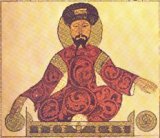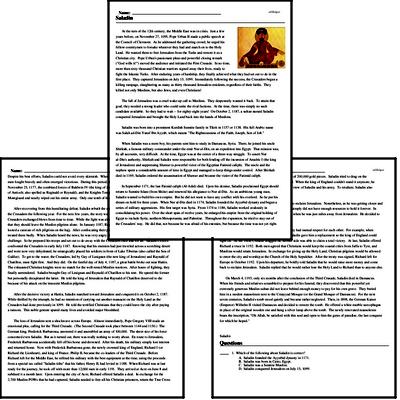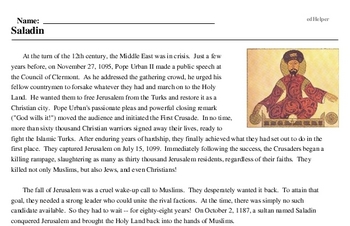Saladin
Saladin
Reading Comprehension for March 4
At the turn of the 12th century, the Middle East was in crisis. Just a few years before, on November 27, 1095, Pope Urban II made a public speech at the Council of Clermont. As he addressed the gathering crowd, he urged his fellow countrymen to forsake whatever they had and march on to the Holy Land. He wanted them to free Jerusalem from the Turks and restore it as a Christian city. Pope Urban's passionate pleas and powerful closing remark ("God wills it!") moved the audience and initiated the First Crusade. In no time, more than sixty thousand Christian warriors signed away their lives, ready to fight the Islamic Turks. After enduring years of hardship, they finally achieved what they had set out to do in the first place. They captured Jerusalem on July 15, 1099. Immediately following the success, the Crusaders began a killing rampage, slaughtering as many as thirty thousand Jerusalem residents, regardless of their faiths. They killed not only Muslims, but also Jews, and even Christians!
The fall of Jerusalem was a cruel wake-up call to Muslims. They desperately wanted it back. To attain that goal, they needed a strong leader who could unite the rival factions. At the time, there was simply no such candidate available. So they had to wait -- for eighty-eight years! On October 2, 1187, a sultan named Saladin conquered Jerusalem and brought the Holy Land back into the hands of Muslims.
Saladin was born into a prominent Kurdish Sunnite family in Tikrit in 1137 or 1138. His full Arabic name was Salah ad-Din Yusuf Ibn Ayyub, which means "The Righteousness of the Faith, Joseph, Son of Job."
When Saladin was a mere boy, his parents sent him to study in Damascus, Syria. There, he joined his uncle Shirkuh, a famous military commander under the emir Nur al-Din, on an expedition into Egypt. That mission was, by all accounts, very difficult. At the time, Egypt was at the center of a three-way struggle. To assert Nur al-Din's authority, Shirkuh and Saladin were responsible for both fending off the incursion of Amalric I (the king of Jerusalem) and suppressing Shawar (a powerful vizier of the Egyptian Fatimid caliph). The uncle and the nephew spent a considerable amount of time in Egypt and managed to keep things under control. After Shirkuh died in 1169, Saladin ordered the assassination of Shawar and became the vizier of the Fatimid caliph.




